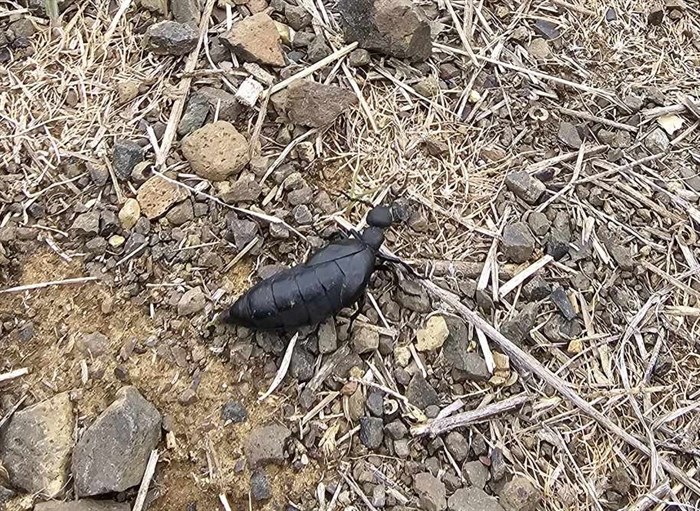
This American oil beetle was spotted at Kenna Cartwright Park in Kamloops.
Image Credit: SUBMITTED/ Kevin Scherrer
May 30, 2024 - 6:00 AM
It's getting warmer in Kamloops and the Okanagan and that means more opportunities to see interesting, and sometimes creepy, insects.
Kamloops resident Kevin Scherrer was walking in a local park last week when a surprisingly large, crawling bug caught his eye.
“It was definitely big, one inch for sure, if not slightly larger,” he said. “At first I thought it was a giant ant."
Scherrer took photographs of the unique American oil beetle before continuing on, and it's a good thing he didn’t touch it.
Not only does the American oil beetle have an impressive size — it can get up to 1.4 inches long — it has an arguably more impressive defence mechanism when stressed.
READ MORE: iN PHOTOS: Avid Vernon hiker captures spectacular scenes in Kamloops, Okanagan
A type of blister beetle, the insects release a fluid that contains a toxin called cantharidin to defend against predators, according to What's That Bug. The chemical is toxic to some insects and vertebrates, and causes swelling, blistering and pain on human skin. Horses that consume hay contaminated with blister beetles can get colic, kidney damage or even die.
Found in grasslands and woodlands throughout the country, the beetles munch on several species of plants and grasses and can cause damage to crops and flowers. The beetle can also damage bee populations as the larvae attach to male bees and ride to the hives where they eat bee eggs and pollen before pupating into adults.
READ MORE: New independent pet hospital opens in Kelowna
The American oil beetle has an elongated, narrow body, short wings and overlapping plates on its abdomen, and can't fly.
If you find the beetles munching on your garden plants, be sure to wear protective gloves before picking them up to dispose of them.
To contact a reporter for this story, email Shannon Ainslie or call 250-819-6089 or email the editor. You can also submit photos, videos or news tips to the newsroom and be entered to win a monthly prize draw.
We welcome your comments and opinions on our stories but play nice. We won't censor or delete comments unless they contain off-topic statements or links, unnecessary vulgarity, false facts, spam or obviously fake profiles. If you have any concerns about what you see in comments, email the editor in the link above. SUBSCRIBE to our awesome newsletter here.
News from © iNFOnews, 2024